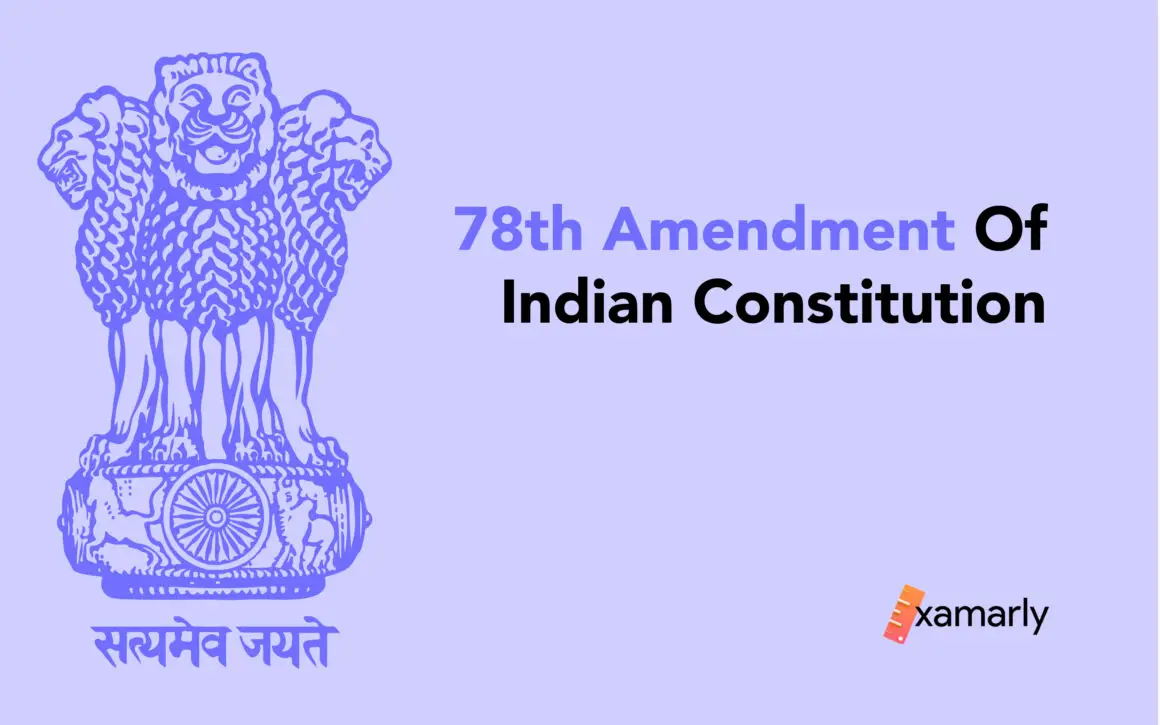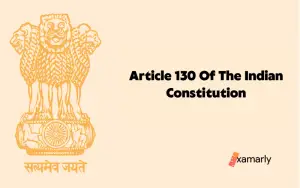The 78th Amendment of Indian Constitution is a piece of legislation that amends the Constitution.
This amendment deals with the incorporation of certain states’ land laws under the ninth schedule in order to shield them from legal action. The legislation included in the ninth schedule of the constitution is not subject to legal challenge.
This article will discuss deeply about the 78th Amendment of Indian Constitution. Read it to further enhance your UPSC CSE Preparation.
78th Amendment Of Indian Constitution
The 78th amendment of Indian Constitution is a piece of legislation that aims to amend the incorporation of land reform laws in states like Bihar, Orissa, Tamil Nadu, West Bengal, Rajasthan, and Kerala in the ninth schedule of the Constitution of India.
The 78th Amendment will give immunity to legal challenges being faced in the court of law. This means the law present in the 9th schedule of the Indian Constitution cannot be challenged before the court. The constitution (1st amendment) act of 1951 added it. Initially, the first amendment included 13 statutes that could not be challenged in court even if they violated individuals’ basic rights. Afterward, through later revisions, 284 laws are added to the Indian constitution’s ninth schedule, which cannot be contested.
When it was tabled in the Rajya Sabha on April 19, 1994, the Constitution (Seventy-eighth Amendment) Act, 1995 was titled the Constitution (Eighty-first Amendment) Bill, 1994. It proposed to modify the Constitution’s Ninth Schedule. The Standing Committee on Urban and Rural Development received a referral on the Bill. On December 15, 1994, the Committee presented its Report to the Lok Sabha and deposited it on the table of the Rajya Sabha. The Bill was passed by the Committee with no recommendations for modifications.
The Bill was considered by the Rajya Sabha on 22 August 1995 and passed on the same day with a formal amendment changing the short title from “Eighty-first” to “Seventy-eighth” and an amendment, moved by Dr. Jagannath Mishra, to substitute the words “entry 257A” for “entry 257” in clause 2 of the Bill. The Bill, as enacted by the Rajya Sabha, was debated and passed by the Lok Sabha on August 25, 1995.
This amendment came into force by parliament in the forty-sixth year of the Republic of India.
78th Amendment of Indian Constitution went into effect on 30th August, 1995.
Waman Rao vs Union of India – Unconstitutionality of the 78th Amendment
Waman Rao versus Union of India is a 1981 case in which the Supreme Court examined the legality of Articles 31a and 31b of the Indian Constitution regarding the notion of fundamental structure, which was adopted in the Kesavananda Bharati decision in 1973.
According to Article 31B read in conjunction with the Ninth Schedule, no Act coming under the purview of the Ninth Schedule may be deemed invalid for failing to uphold the Fundamental Rights guaranteed by Part III of the Constitution.
According to the law, any act or regulation that is included in the ninth schedule is automatically given protection under Article 31B and is not deemed invalid for violating the people’s fundamental rights. In light of this, the petitioners claimed that Article 31B is at odds with the Fundamental Rights.
Fundamental Rights in the Constitution of India include the right to equality, the right to freedom, the right to be free from exploitation, the right to religious freedom, cultural and educational rights, and the right to constitutional remedies.
The theory of fundamental structure concerns the Parliament’s ability to modify the constitution. Article 368 of the constitution states that although parliament has the unrestricted authority to change the constitution, it cannot change its fundamental principles. The list of elements in the fundamental structure is not all-inclusive.
The judiciary is responsible for determining which parts fall under the basic framework of the constitution. The fundamental framework of the constitution includes elements such as fundamental rights, parliamentary, secularism, and democracy. The Court of India made an important remark about the doctrine’s application and decided that it should not have a retroactive effect.
All judgments made before the establishment of the theory of fundamental structure in the Kesavananda Bharati case would have a retroactive effect. According to the ruling, all acts and regulations in the Indian Constitution’s 9th Schedule that were in effect before the Kesavananda Bharati v. State of Kerala decision would continue to be valid, and any subsequent amendments to the schedule could be questioned on the basis that they violated the basic structure doctrine.
As a result, the court ruled that all legislation listed in the Ninth Schedule prior to the Kesavananda case would be protected by Article 31B. Acts and Regulations put in the Ninth Schedule after the Kesavananda verdict, on the other hand, would not be shielded under Article 31B and would be subject to review for breaching the essential structure of the Constitution.
Objects And Reasons
Article 31B of the Constitution grants immunity from a legal challenge on the grounds that they infringe the Fundamental Rights entrenched in Part III of the Constitution. These enactments were placed in the Constitution’s Ninth Schedule. The Schedule is a list of laws enacted by various State and Central governments that, among other things, influence rights to and interests in real estate, including land.
Previously, anytime progressive legislation created in the public’s interest was jeopardized by litigation, the Ninth Schedule was invoked. As a result, the number of state laws dealing with land reform and agricultural land holding limits has already been incorporated into the Ninth Schedule. Given the Government’s commitment to prioritizing land reforms, it became imperative to insert land reform measures in the Ninth Schedule to prevent them from being challenged in court. The state governments of West Bengal, Orissa, Bihar, Kerala, Tamil Nadu, Orissa, Karnataka, Tamil Nadu, and Rajasthan have proposed adding some of their land reform-related laws to the Ninth Schedule.
Because amendments to existing Ninth Schedule acts were not automatically immune from judicial challenge, a number of Amendment acts, as well as a few primary acts, were recommended to be incorporated into the Ninth Schedule to guarantee that execution of these acts was not hampered by litigation.
Important Provision
This Amendment Act Amended the 9th Schedule of the Constitution. This added 27 additional State enactments (Entries No. 258 to 284) relating to land laws or land reform acts after Entry 257A and before the Explanation, to clarify that the said enactments shall not be deemed void because they are inconsistent with any of the provisions of Part III of the Constitution relating to Fundamental Rights.
258. The Bihar Privileged Persons Homestead Tenancy Act, 1947 (Bihar Act 4 of 1948).
259. The Bihar Consolidation of Holdings and Prevention of Fragmentation Act, 1956 (Bihar Act 22 of 1956).
260. The Bihar Consolidation of Holdings and Prevention of Fragmentation (Amendment) Act, 1970 (Bihar Act 7 of 1970).
261. The Bihar Privileged Persons Homestead Tenancy (Amendment) Act, 1970 (Bihar Act 9 of 1970).
262. The Bihar Consolidation of Holdings and Prevention of Fragmentation (Amendment) Act, 1973 (Bihar Act 27 of 1975).
263. The Bihar Consolidation of Holdings and Prevention of Fragmentation (Amendment) Act, 1981 (Bihar Act 35 of 1982).
264. The Bihar Land Reforms (Fixation of Ceiling Area and Acquisition of Surplus Land) (Amendment) Act, 1987 (Bihar Act 21 of 1987).
265. The Bihar Privileged Persons Homestead Tenancy (Amendment) Act, 1989 (Bihar Act 11 of 1989).
266. The Bihar Land Reforms (Amendment) Act, 1989 (Bihar Act 11 of 1990).
267. The Karnataka Scheduled Castes and Scheduled Tribes (Prohibition of Transfer of Certain Lands) (Amendment) Act, 1984 (Karnataka Act 3 of 1984).
268. The Kerala Land Reforms (Amendment) Act, 1989 (Kerala Act 16 of 1989).
269. The Kerala Land Reforms (Second Amendment) Act, 1989 (Kerala Act 2 of 1990).
270. The Orissa Land Reforms (Amendment) Act, 1989 (Orissa Act 9 of 1990).
271. The Rajasthan Tenancy (Amendment) Act, 1979 (Rajasthan Act 16 of 1979).
272. The Rajasthan Colonisation (Amendment) Act, 1987 (Rajasthan Act 2 of 1987).
273. The Rajasthan Colonisation (Amendment) Act, 1989 (Rajasthan Act 12 of 1989).
274. The Tamil Nadu Land Reforms (Fixation of Ceiling on Land) Amendment Act, 1983 (Tamil Nadu Act 3 of 1984).
275. The Tamil Nadu Land Reforms (Fixation of Ceiling on Land) Amendment Act, 1986 (Tamil Nadu Act 57 of 1986).
276. The Tamil Nadu Land Reforms (Fixation of Ceiling on Land) Second Amendment Act, 1987 (Tamil Nadu Act 4 of 1988).
277. The Tamil Nadu Land Reforms (Fixation of Ceiling on Land (Amendment) Act, 1989 (Tamil Nadu Act 30 of 1989).
278. The West Bengal Land Reforms (Amendment) Act, 1981 (West Bengal Act 50 of 1981).
279. The West Bengal Land Reforms (Amendment) Act, 1986 (West Bengal Act 5 of 1986).
280. The West Bengal Land Reforms (Second Amendment) Act, 1986 (West Bengal Act 19 of 1986).
281. The West Bengal Land Reforms (Third Amendment) Act, 1986 (West Bengal Act 35 of 1986).
282. The West Bengal Land Reforms (Amendment) Act, 1989 (West Bengal Act 23 of 1989).
283. The West Bengal Land Reforms (Amendment) Act, 1990 (West Bengal Act 24 of 1990).
284. The West Bengal Land Reforms Tribunal Act, 1991 (West Bengal Act 12 of 1991).”.
Conclusion
Based on the foregoing, we may deduce that the 78th amendment of Indian Constitution is about the inclusion of land laws legislation in certain states of India in the 9th Schedule of the constitution. Amendment process on a regular basis to remove old and ineffective sections and incorporate new ones in response to changing societal requirements. As a result, adjustments are necessary, but they should improve people’s living standards and promote harmony in society rather than dismantle the present structure.






